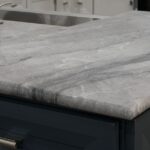Concrete is a great material. It’s incredibly strong, so much so that it’s used to make amazingly huge buildings. It’s one of the oldest man-made materials that are still in use today, and it keeps getting better. Not many people would think it would be a countertop material, but it is! So, let’s talk about some concrete countertop pros and cons.
Concrete countertops tend to be quite overlooked. When people think about concrete, they normally think about the irregular gray concrete floors that many houses have. Those a cheap outdoor floors that do their job very well: take a lot of beating while not calling attention to it. How could it be useful as a countertop?
Well, concrete can be surprisingly flexible in how it’s made and used, so it has some interesting advantages. Let’s check it out.
Concrete Countertop And Its Pros And Cons – A Brief Guide
Concrete is surprisingly durable and long-lasting, while also being flexible enough that you can put it anywhere. Still, it behaves a bit like natural stone, in that it’s quite porous, can chip and crack, and needs to be sealed in order to protect it.
Let’s talk about concrete countertop pros and cons in more detail.
Pros
The main advantage of concrete is that it isn’t cut from stone. Instead, it’s custom-made and custom-shaped. That is: it allows you to have a countertop of pretty much any shape. It’s so flexible that many people even go for a DIY approach to get a custom-shaped countertop.
However, for a high-quality countertop, getting experienced technicians is the best option. In this case, the countertop is custom-built in the shop, following your specifications, and then hauled to your home. This allows them to use many different kinds of tools and take their time to give it a great finish. It makes it look incredible!
You can also help to make the concrete more durable by adding reinforcing materials to it, like rebars and wire meshes, and make it thick enough that you can’t see the reinforcement after it’s dry. And if you’re not happy with the surface you got, you can even add a custom layer of another material, like steel or ceramic tiles, in order to get a better look while maintaining its strength.
But the customization doesn’t stop there. You can also mix a wide amount of colors and other kinds of materials in order to change its appearance. You can get it to look pretty much just the way you want. Not only that, but you may even be able to pass it for natural stone!
And along with all that, you get a very hard, heat-resistant and long-lasting surface. High-quality concrete can last a long time, as you may notice from the many concrete-made buildings you can find around the world.
Cons
Unfortunately, nothing is perfect. Even though concrete comes with many advantages, it also has some disadvantages that you have to keep in mind.
The first, that we mentioned earlier, is that, although it’s a man-made material, it doesn’t behave like engineered stone. It’s more similar to natural stone. That is: it’s quite porous, meaning it’s prone to staining, can chip and crack, and needs to be sealed regularly in order to prevent staining.
The porosity comes from the way it’s made: concrete is pretty much a mixture of sand and rocks of different sizes glued together by cement paste. Those grains don’t always fit tightly together, leaving some gaps into which water can get in, and the cement doesn’t do a good job of filling in those pores either.
Not only can porosity lead to stains, but if water seeps into the concrete, it can make it more prone to cracking. The advantages that concrete has in relation to natural stone in this case is that concrete can be repaired a bit more easily: you can make the mixture again and set it onto the chips and cracks to make them look better while also retaining its appearance.
Another problem, though, is weight. Concrete countertops can be incredibly heavy, much heavier than natural stones. If you’re looking for a concrete countertop as an afterthought, you need to either consider reinforcing your counter and your floor, or get a countertop of another material, because it’ll probably not hold up very well.
Price
A final and maybe surprising disadvantage is price. Concrete countertops can be very expensive, and the price per square feet can be greater than granite. This is one of the reasons why you don’t see many concrete countertops around. Not to mention the cost of making a reinforced counter to be able to handle it.
That cost doesn’t come only from the price of concrete. While natural stones normally come in ready-to-cut slabs and can be quite quickly transported and installed, concrete has other matters to watch out for.
The price per square feet can easily go upwards of $100, not accounting for customization. Installation is also more expensive, because it’s much heavier than other stones. And concrete also needs to cure. Curing can take up to 28 days, and only after that can the countertop be sealed and prepared for installation. All this waiting time puts quite a burden on the technicians, as they have to reserve space for it cure in peace.
All in all, concrete is pretty much a very high-end option for a countertop. Unless you’re looking for extreme customization or you have a weirdly shaped counter, you’d probably be better off with a regular stone countertop.
Need Some Help With Your Countertops?
Choosing a material for a countertop can be quite difficult. There are many different options to pick from, and the more you learn about countertops, the more options appear. Still, each material has its own best practices and best applications, and if you know what they are, it becomes easy to decide among them.
That’s why you should seek the aid of a specialist. Here at Eagle Stones, we specialize in stone countertops. We have a wide selection of materials and expertly trained technicians, so we can help you pick a material for your countertop.
Just fill this form, and we’ll send you a specialist for a free estimate! It’s the best way to get a countertop.



